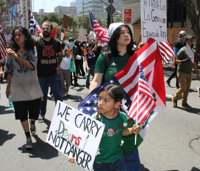
Board of Supervisors approves motion on the state of Latinos in L.A. County. (Ed Freeman / Getty Images)
Today, the Los Angeles County Board of Supervisors unanimously approved a motion authored by Chair Pro Tem Hilda L. Solis and co-authored by Supervisor Lindsey P. Horvath to move forward with a series of directives, including directing the Chief Executive Office, through the Anti-Racism, Diversity, and Inclusion (ARDI) Initiative, to create “A State of Latinidad Los Angeles County” report, to better address the disparities around education, health, economic opportunity and housing impacting Latinos in Los Angeles County.
Los Angeles County is home to over 4.7 million Latinos, who constitute the largest ethnic group in the region and, for generations, have played a crucial role in shaping the County’s cultural, economic, and social landscape. However, despite being a key driver of L.A. County’s economic growth and an essential source of economic strength, Latinos still face significant disparities in outcomes including education, health, economic, well-being, housing, literacy and access to green spaces. This is an opportunity for the County to increase equity, promote the well-being of Latino residents, and ensure a vibrant Los Angeles County where Latinos fully participate in, contribute to and benefit from everything this region has to offer.
“Los Angeles County has the responsibility to understand how our diverse Latino communities are doing so that we can do better for--and with--them,” said Supervisor Horvath. “Through the leadership of Supervisor Solis, the State of Latinos in L.A. County will provide a comprehensive look at the varied outcomes, opportunities, and challenges our Hispanic, Latino, and Latinx neighbors face. There is no Los Angeles without our Latino community, and we owe it to every Latino Angeleno to strengthen County supports to lift up every individual and every family.”
In a 2019 report by the United States Census Bureau, over 761,000 Latinos in the County were living below the poverty level. In Los Angeles County, one in four Latino households earned less than $40,000 per year, 54% were rent-burdened and 26% were considered severely rent-burdened.
According to the 2022 Greater Los Angeles Homeless Count, the number of Latinos experiencing homelessness increased by 26% despite an overall decrease in the number of people experiencing homelessness. In partnership with the Los Angeles Homeless Service Authority (LAHSA), the County has been studying the increase of homelessness among Latinos for the past two years.
The growing number of Latinos living below the poverty level or experiencing homelessness highlights the need for the County to work towards a plan to promote economic prosperity and ensure families have well-paying jobs.
Latino students experience lower high school graduation rates and college enrollment compared to their peers in other racial and ethnic groups. In the Los Angeles Unified School District (LAUSD), Latino students are falling significantly behind their white counterparts in academic performance, with only 35.33% of Latino students meeting English proficiency standards, and 24.29% of Latino students proficient in math. According to the Alliance for Better Communities, this education disparity restricts access to higher-paying jobs and prevents opportunities for career advancement. These differences also point to the need to invest in early childhood education and supporting educators to positively influence long-term academic success, which is essential for breaking cycles of poverty and inequality.
Latinos have also continuously faced chronic healthcare inequities including routine and preventative care, mental health and wellness resources, which is only exacerbated by the shortage of culturally competent and Spanish-speaking medical professionals and providers. In addition, the L.A. County Department of Public Health (DPH) has found 53% of adults in the County have low literacy levels that affect their ability to access and understand County services. This can further impact Latino access to healthcare and other services from the County.
The L.A. County Department of Parks and Recreation, through their 2016 Countywide Park Needs Assessment, has identified the L.A. region as having the least amount of accessible park space, which is especially true for Latino communities in the First District. The lack of parks and green spaces not only limits opportunities for physical activity and outdoor gatherings but also denies these communities the environmental and mental health benefits that green spaces provide, such as cooler temperatures.
“Today’s motion reflects the County’s ongoing efforts to develop a strategic and comprehensive plan to address the challenges Latino residents face, that impede equitable access to education, health, well-paying jobs and housing,” said Chair Pro Tem Solis. “I am deeply committed to work towards a County in which Latinos have all the resources that they need to thrive.
The motion directs the Chief Executive Office to identify $600,000 in one-time funding to produce the report through the Budget Operations and Management Branch, as part of the Fiscal 2025-2026 Recommended Budget phase.
The motion will also request cooperation from several county departments to address the needs of the Latino community, including the Los Angeles County Office of Education (LACOE) to coordinate with school districts to develop a set of recommendations to improve literacy, increase high school graduation rates and college enrollment rates among Latino students.
The Department of Public Social Services (DPSS) will report back in writing on Medi-Cal enrollment and disenrollment rates of Latinos countywide, and enrollment rates for CalFresh and cash aid programs, including services to individuals and families experiencing homelessness.
The motion’s directives also enlist the Department of Economic Opportunity (DEO) and the Department of Consumer and Business Affairs (DCBA) to conduct a comprehensive analysis of programs aimed at increasing economic mobility, entrepreneurship, and financial literacy in neighborhoods with high Latino populations, including programs for working families including Microenterprise Home Kitchen Operation (MEHKO), compact mobile food operations and union apprenticeships.
The Department of Public Works (DPW), in consultation with the Department of Parks and Recreation, will review multimodal access to open spaces, parks, and recreational opportunities in predominantly Latino communities, among other directives.
To read the motion in full, click here.











(0) comments
Welcome to the discussion.
Log In
Keep it Clean. Please avoid obscene, vulgar, lewd, racist or sexually-oriented language.
PLEASE TURN OFF YOUR CAPS LOCK.
Don't Threaten. Threats of harming another person will not be tolerated.
Be Truthful. Don't knowingly lie about anyone or anything.
Be Nice. No racism, sexism or any sort of -ism that is degrading to another person.
Be Proactive. Use the 'Report' link on each comment to let us know of abusive posts.
Share with Us. We'd love to hear eyewitness accounts, the history behind an article.